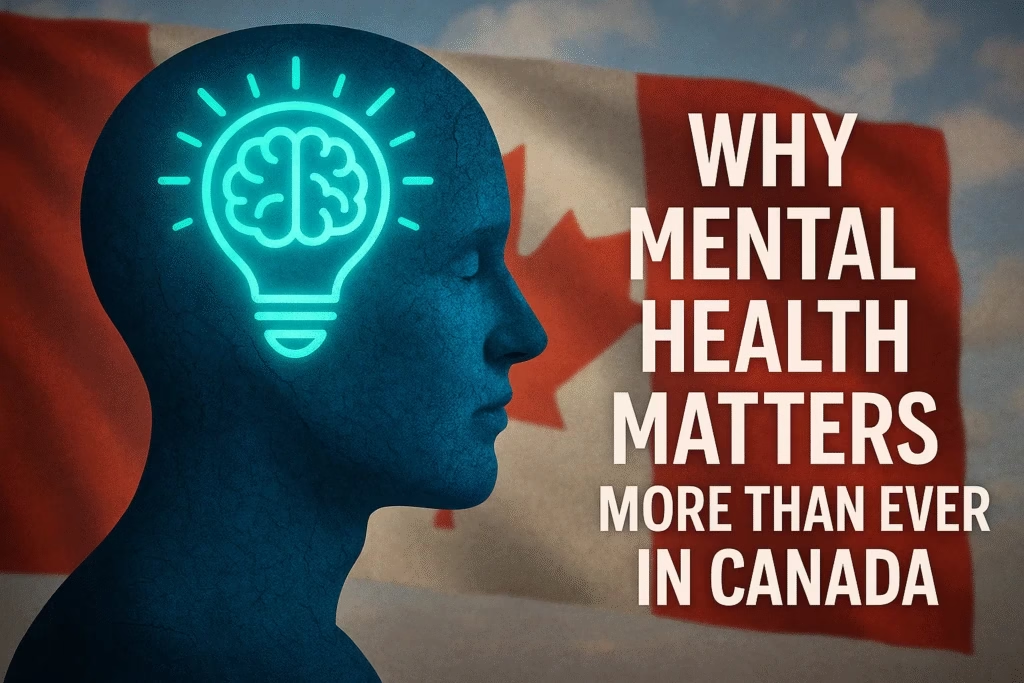In recent years, mental health has become one of the most talked-about topics in Canada—and for good reason. The pandemic, rising living costs, job pressure, and social media have all impacted how Canadians feel emotionally and mentally.
In 2025, more Canadians than ever are seeking help, supporting each other, and understanding that mental health is just as important as physical health. This article explores why mental wellness matters, what resources are available, and how you or someone you love can get support.

Mental Health in Canada: A Quick Look
According to the Canadian Mental Health Association (CMHA):
- 1 in 5 Canadians experience a mental health issue each year.
- Anxiety and depression are the most common problems reported.
- Suicide remains one of the top causes of death among youth aged 15–24.
- Indigenous, LGBTQ+, and racialized communities often face even greater challenges.
These numbers show that mental health affects everyone—young or old, rich or poor, rural or urban.
Why Mental Health Is Getting More Attention in 2025
Several trends are making mental health a bigger priority:
1. Post-Pandemic Stress
Even after COVID-19, people are still feeling the effects of isolation, job loss, and grief. Many are dealing with long-term anxiety or burnout.
2. Social Media Pressure
Teens and young adults in particular are feeling overwhelmed by the constant pressure to look and act a certain way online.
3. Workplace Burnout
Many Canadians are working more than ever just to keep up with inflation. As a result, burnout is on the rise, especially in healthcare, education, and tech.
4. Better Awareness
The good news? Canadians are now more open than ever to talking about mental health without shame. Celebrities, athletes, and even politicians are speaking out, making it easier for others to do the same.
The Role of the Canadian Government and Health System
To help meet the growing demand, governments in Canada are investing more in mental health than ever before:
- Wellness Together Canada (WTC) offers free, 24/7 mental health support online and by phone.
- Provinces like Ontario and BC are expanding access to counselling and therapy in schools and workplaces.
- Mental Health Week (May) and Bell Let’s Talk Day have become major awareness campaigns.
There’s also a push for universal mental health care, where therapy and counselling are covered like doctor visits.
Where to Get Help in Canada
You don’t need to go through tough times alone. Here are some of the best ways to find support:
1. Talk to Your Doctor
Your family doctor can refer you to therapists or prescribe medication if needed.
2. Free Helplines
- Talk Suicide Canada: 1-833-456-4566 (24/7)
- Kids Help Phone: 1-800-668-6868
- Hope for Wellness: 1-855-242-3310 (for Indigenous Peoples)
3. Online Therapy
Platforms like BetterHelp, Inkblot, and MindBeacon offer affordable, licensed therapy online—many with Canadian therapists.
4. Community Support
Check with local community centres or CMHA branches for free peer support groups and workshops.
Mental Health at Work and School
Workplaces and schools are now offering more support than ever:
- Employee Assistance Programs (EAPs) often include free short-term therapy.
- Universities and colleges have 24/7 mental health counsellors and apps like MySSP for students.
- Some companies even offer “mental health days” as part of paid time off.
If your school or job doesn’t offer support, ask your HR department or school counsellor what’s available.
Tips for Better Mental Health
Improving mental wellness doesn’t always need a doctor. Here are simple steps anyone can take:
- Stay active – Exercise releases feel-good chemicals.
- Eat well – A balanced diet supports brain health.
- Sleep regularly – Rest is vital for mood and focus.
- Limit screen time – Too much social media can increase anxiety.
- Stay connected – Talk to friends or family often.
- Practice mindfulness – Apps like Calm or Headspace can help reduce stress.
Remember: It’s okay to ask for help. Just like you’d go to a doctor for a broken arm, you deserve help for emotional pain too.
Mental Health in Indigenous and Marginalized Communities
Mental health isn’t the same for everyone. Indigenous communities, people of colour, refugees, and LGBTQ+ Canadians often face extra challenges due to racism, trauma, or lack of access.
Organizations like Native Child and Family Services, Black Health Alliance, and Egale Canada are working to provide culturally safe and inclusive support for these groups.
What Canadians Can Do to Support Mental Wellness
Whether or not you struggle personally, there are ways to help:
- Check in on friends and loved ones.
- Listen without judgment when someone opens up.
- Share mental health resources on social media.
- Volunteer with local mental health groups.
- Support policies that make mental health care accessible to all.
Together, we can build a kinder and more supportive Canada.